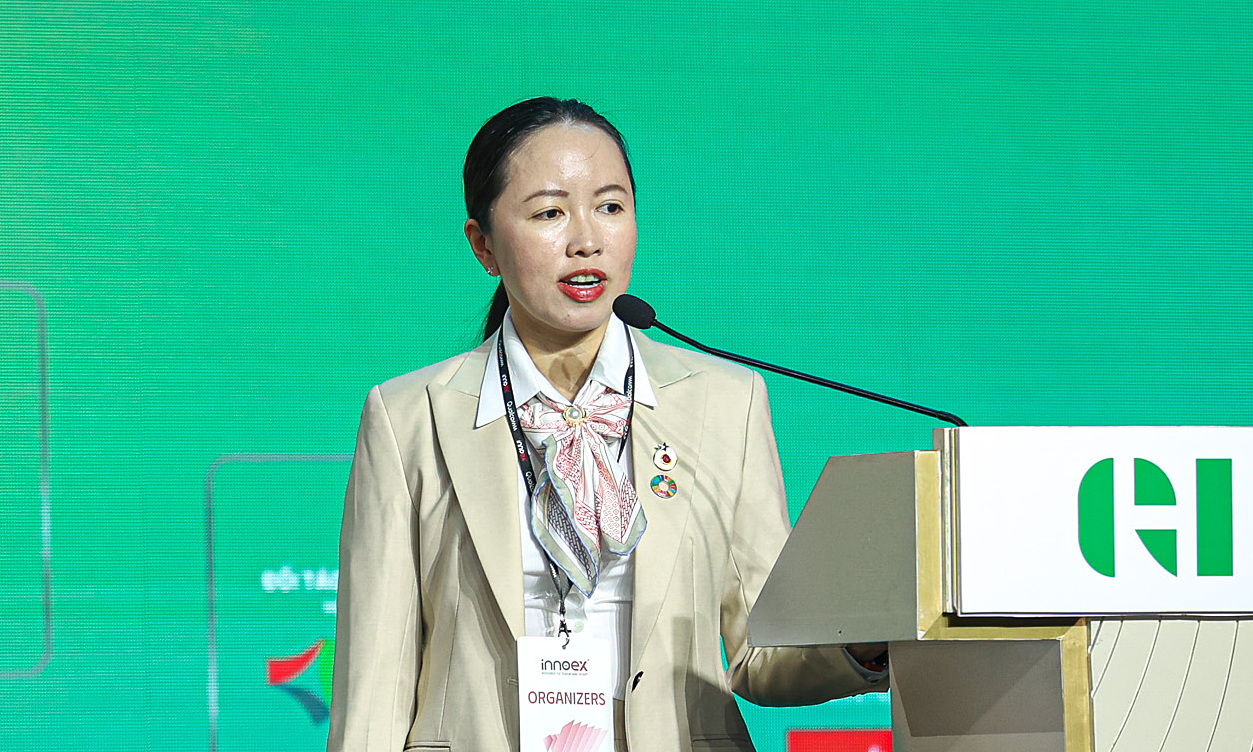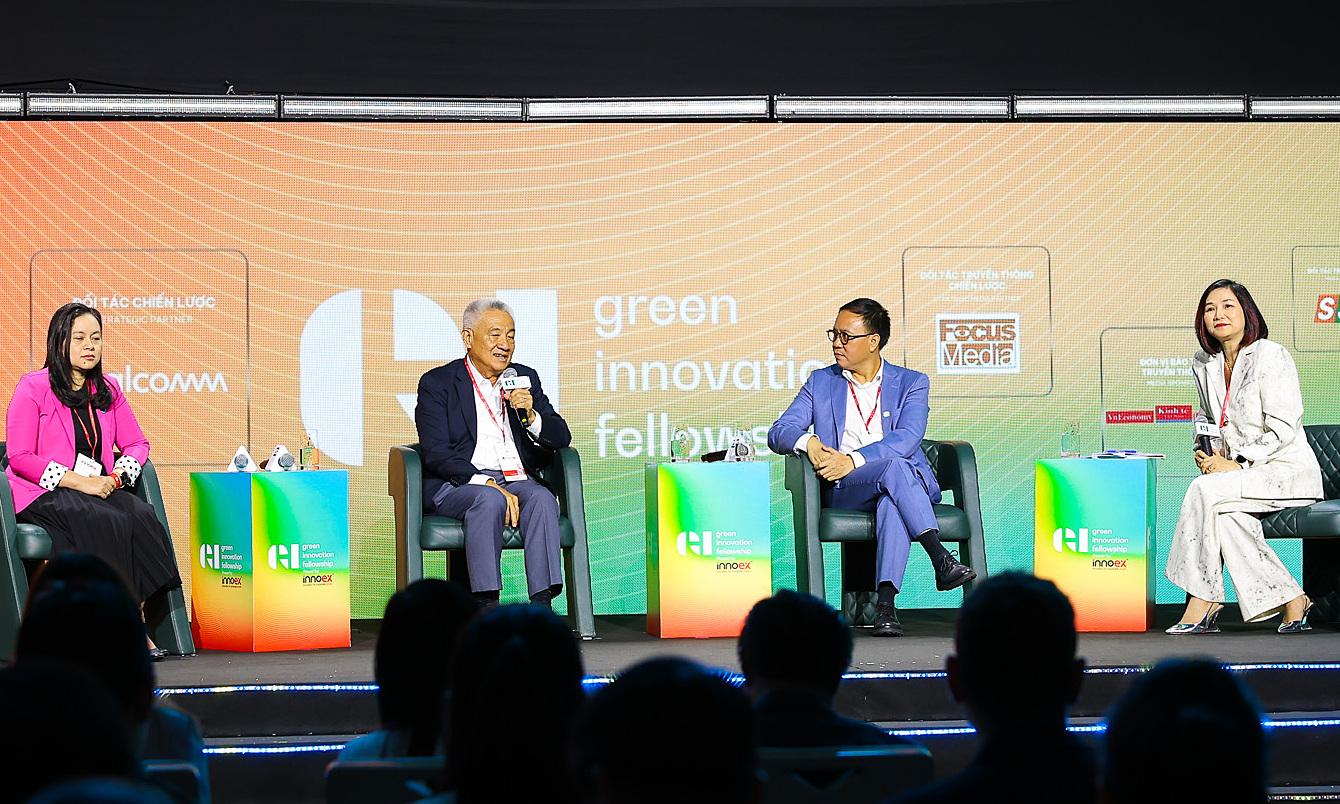While sorting packaging into recycling bins at a shopping center, Tran Phuong Ngoc Thao, Vice President of the Young Entrepreneurs Association of Ho Chi Minh City, was reminded by her child that this method wasn't enough to protect the planet. She needed to prioritize reuse and recycling.
This past summer, while visiting her sister studying abroad in the UK, Thao noticed all the household essentials were from sustainable brands. When she ran out of laundry detergent and bought a familiar, well-known brand with a green label, her sister suggested trying only a few pods before returning to her preferred sustainable brand.
"My sister's actions demonstrate a significant shift in shopping trends," Thao said at the Green Innovation Summit 2025, part of the International Forum and Exhibition on Innovation – InnoEx 2025 on 22/8.
 |
Tran Phuong Ngoc Thao speaking at the event. Photo: Organizers |
Tran Phuong Ngoc Thao speaking at the event. Photo: Organizers
Thao's anecdotes illustrate a consumer force experts call the "Net Zero generation." This group, not limited by age, prioritizes sustainable products.
"The Net Zero generation includes me, my children, my grandchildren, and everyone in the community who feels responsible for the environment," said Dr. Nguyen Thanh My, Chairman of Rynan Technologies Vietnam, a company developing "ethical shrimp" farming solutions that reduce greenhouse gas emissions compared to traditional intensive methods.
Recent studies show the Net Zero generation is growing in Vietnam. According to a survey by the Vietnam High Quality Goods Association, consumer support for green products made from natural or recycled materials scored 4 or higher on a scale of 1 to 5, with 5 being "very high priority."
An online survey by market research firm Q&Me revealed Vietnamese consumers primarily associate sustainability with environmental protection, plastic waste reduction, and recycling. 90% of respondents said they would choose a sustainable brand if the price and quality were comparable.
The growth of the Net Zero generation presents numerous opportunities. Thao noted a new market gap for sustainable brands, with relatively few competitors. "This is a challenge, but also a chance for Vietnamese businesses to quickly introduce sustainable products to meet the demand for responsible consumption," she said.
This trend extends beyond Vietnam. A 2024 PwC survey found global consumers willing to pay almost 10% more for products with ESG transparency. Deloitte reported 62% of customers willing to pay up to 20% more for environmentally friendly products.
 |
Experts at the Green Innovation Summit 2025 panel discussion. Photo: Organizers |
Experts at the Green Innovation Summit 2025 panel discussion. Photo: Organizers
Thai Van Chuyen, CEO of Thanh Thanh Cong - Bien Hoa (TTC AgriS), believes sustainable development increases competitiveness and prevents market exclusion. TTC AgriS operates in high-tech agriculture, managing a closed value chain from farm to production to consumption.
Currently, 30% of their products are organic, 95% of wastewater is reused, and they use 100% biomass and solar energy. Combined with technology-driven management solutions, TTC AgriS generates over one billion USD in annual revenue, exporting to 69 countries. "Green transition is an inevitable trend as the world changes with stricter regulations and requirements from governments, markets, and international customers," he stated.
Phuc Sinh also found success by anticipating the international demand for sustainable products. Phan Minh Thong, Chairman of Phuc Sinh, recalled a 2008 incident where a Dutch corporation demanded sustainability certification for their pepper products or removal from the supply chain.
In 2010, he invested 200,000 USD in a sustainable development project that failed. Undeterred, by 2014, Phuc Sinh achieved Rainforest Alliance certification for their farms. From 400-500, now more than 10,000 farming households participate.
In Son La, Phuc Sinh purchased equipment and invited experts from Colombia to build a 100% sustainably certified coffee factory in a region known for its little-known Arabica coffee. "The factory, inaugurated in 2018, sold out its products after five years, recouping the investment in six," he shared.
With their enhanced reputation, the price of Son La coffee has risen from 6,500 to 24,000-25,000 dong per kg. "Investing in sustainable development has fueled our growth. In 2024, we received funding from three Dutch ESG investment funds," he added.
Facing both opportunities and pressures related to the green transition, Dinh Hong Ky, Chairman of the Ho Chi Minh City Green Business Association (HGBA), observed a shift in business perspectives on sustainability. It has moved from voluntary to mandatory, from individual efforts to alliances, from corporate social responsibility (CSR) to a core business value, and from pilot projects to widespread adoption.
However, challenges persist, with 90% of small and medium-sized enterprises unprepared for the green transition despite recognizing its importance. Developing ecosystems to support this transition, fostering green markets, and mobilizing green resources, including capital and human resources for sustainable projects, are crucial.
According to Ky, the business community needs concrete support policies, not just general guidelines. Recently, the government issued green transition standards for various sectors. Ho Chi Minh City is also developing standards and implementing related programs. "However, so far, much of it remains unclear," he stated.
Vien Thong












